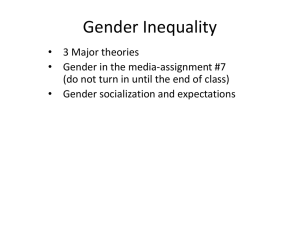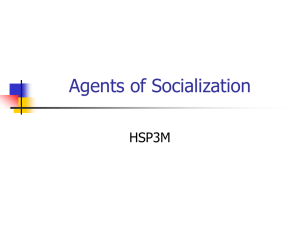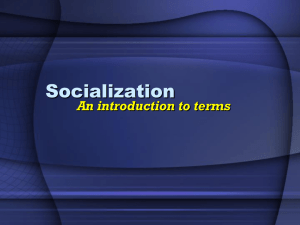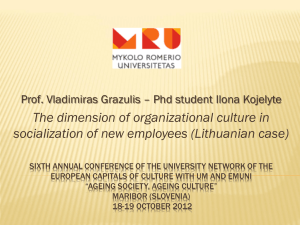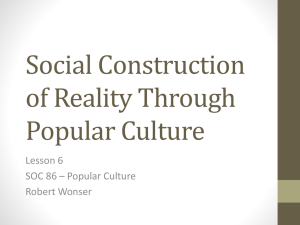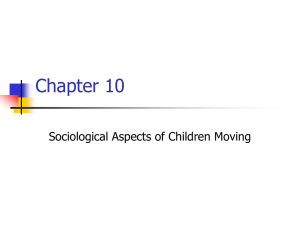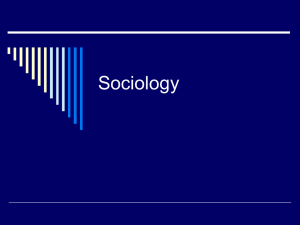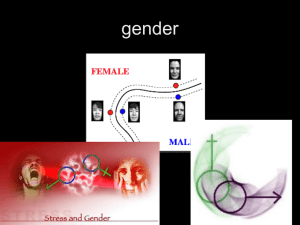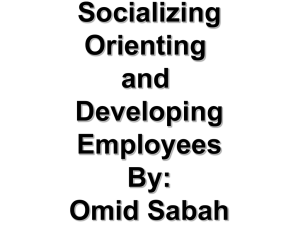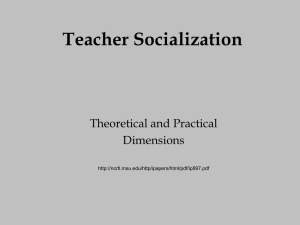POLI 209- Analyzing Public Opinion
advertisement
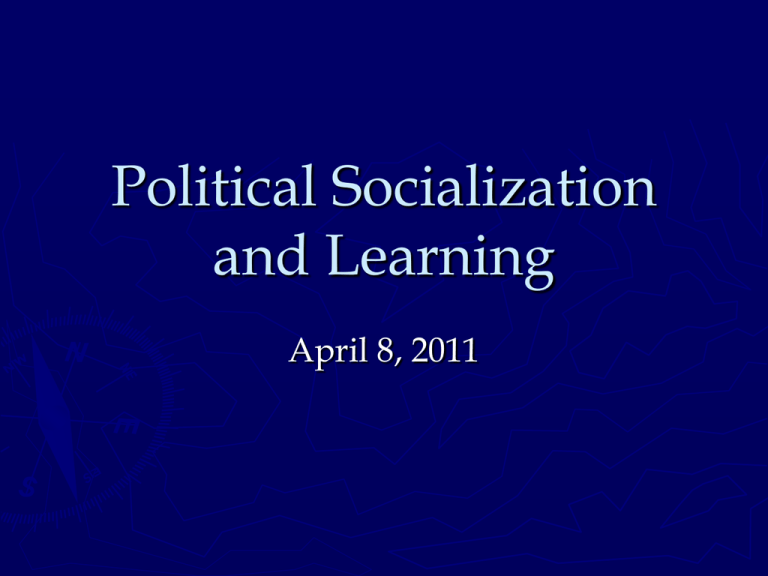
Political Socialization and Learning April 8, 2011 Objectives By the end of this meeting, you should be able to: a) Describe the stages of political socialization. b) Explain how agents of socialization are influential on individuals’ political outlook. c) Distinguish life cycle, period effects, and generation effects on political attitudes What is Political Socialization? a) There are two general ways to look at political socialization: • • The process by which people learn the attitudes, values, and behavior to fit into political life The process of political learning Describe an experience that influenced your outlook on politics. Childhood Socialization Pre-School Socialization a) Before children go to school, they tend to have only have the haziest of ideas about government b) Most pre-school children are only able to identify the president and policemen as authority figures and they are more likely to view the latter as more benevolent c) Most pre-school children are able to identify the US flag so there is some identification with their country, if not necessarily with its government Childhood Socialization Early Childhood a) Children begin to notice government quickly after they enter school but the ideas tend to be very general and positive b) Children tend to view the president in the same vein as the benevolent policemen. His power is undefined but is generally a positive and kind figure Childhood Socialization Late Childhood a) By 10 or 11, children start to develop more advanced attitudes towards government b) A division begins to develop between and elected officials and their positions c) A general adult sense of citizenship begins to develop. No longer is being a citizen confined to not breaking the law and being nice but more advanced concepts like voting and being politically involved d) Overall, in this period, children tend to be largely uncritical of government Young Adult Socialization Adolescence a) During this period, people begin to develop more adult attitudes towards government b) Children begin to understand the division between the individual and society c) Nascent party identification and ideology begin to develop d) One description of this period is as one of “de-idolization” Childhood Socialization to Citizenship a) One question that political scientists ask: To what extent does the way in which people are socialized have an effect on their adult behavior? b) African Americans, Mexican Americans and some poor rural whites have more negative attitudes towards government. c) Political events clearly impact the process of socialization • Dramatic national events (9/11, Watergate, etc.) can affect young people’s attitudes immediately. • Elections, particularly those that are more influential, seem to increase partisan attitudes among adolescents. Agents of Socialization Family a) Politically active parents and especially those that discuss politics with their children are more likely to have children that politically involved b) There is generally a view that parents and children have similar attitudes towards issue • • There are clearly generational issues Children tend to over report the level of issue similarity Agents of Socialization Family (cont.) c) The thing that is most likely to be transferred from parents to children is partisanship although there does seem to be some decline of this relationship over time d) Generally when children do not absorb their parents’ partisanship they are more likely to move to independent rather than the opposing party Agents of Socialization The process a) Communication- children may be more likely to absorb parents’ partisanship because the parents are likely to most clearly communicate that identification with their children. When issue stances are clear, children seem to pick them up as readily as partisanship. The problem is those signals are rarely as clear as partisanship. Agents of Socialization b) Rational Adaptation- As children reach adulthood it is rational for them to mimic the partisanship and attitudes of more experienced people of similar backgrounds. Parents are an obvious choice c) Genetics- Studies of identical and fraternal twins suggest that parts of our genes may make a person predisposed to have certain attitudes on some issues Agents of Socialization Spouse a) There is some research that suggests that marriage has a socialization effect. One major panel study found that over time spouses became more like each other in terms of partisanship and issue attitudes b) It seems like generally there is more movement of wives towards their husband’s positions than vice versa c) Divorce issue Agents of Socialization Peer Group a) There is conflicting evidence about the importance of peer groups in the development of partisanship and issue attitudes b) The consensus is that whatever influence peer groups have it is generally less than that of parents Agents of Socialization Primary and Secondary School a) Internationally most governments require some political education in school • Inset 2-1: What did you find interesting? b) There is disagreement about how effective civic education is at imparting political values c) In the US, it does seem that early education does tend to reinforce attitudes of patriotism and obedience to authority Agents of Socialization Primary and Secondary School (cont.) d) Despite political education in school, adolescents tend to be very poorly informed about political affairs e) One thing that does have a strong effect on political activity later in life is extracurricular and community activities. Those who are more involved in high school are much more likely to be active politically as adults Agents of Socialization Higher Education a) The general finding is that young people that go to college are more likely identify themselves as liberals and express liberal attitudes b) That fact is attributed to three broad ideas: • • • Increased awareness of multiple views ‘Enlightenment’ Ideological indoctrination Agents of Socialization Higher Education (cont.) c) The effect of college does appear to cycle over time. Students in the 1980s and the 1990s were more conservative than students in the 1960s and 1970s. d) What is clear is that college appears to have an effect on attitudes. Young people with a college education have more liberal attitudes than those of the same age without a college education Agents of Socialization Adult Socialization a) Socialization does not stop when a person reaches adulthood, however attitudes tend to be relatively stable by the mid 30s b) Generation effects- collective effects that occur during the period when a cohort reaches adulthood c) Life style effects- changes that occur due to changes in age (i. e. conservatism and age) d) Period effects- time dependent changes (i. e. Great Depression, Vietnam War, etc.) Agents of Socialization Adult Socialization (cont. ) e) Since a partisanship and attitudes tend to become stable (not unchanging) in early adulthood, there can be major cohort differences in partisanship f) What effect do you think that the two current wars and the Obama presidency will have on partisanship and attitudes? For Next Time a) Read Clawson & Oxley, chapter 3. b) Why might BBC news be better set-up to serve a democracy than American news? Why might it be a worse model? (see pp. 61-62) c) Name an advantage and a disadvantage of the concentration of local news into a few large companies. (see pp. 65-68)
